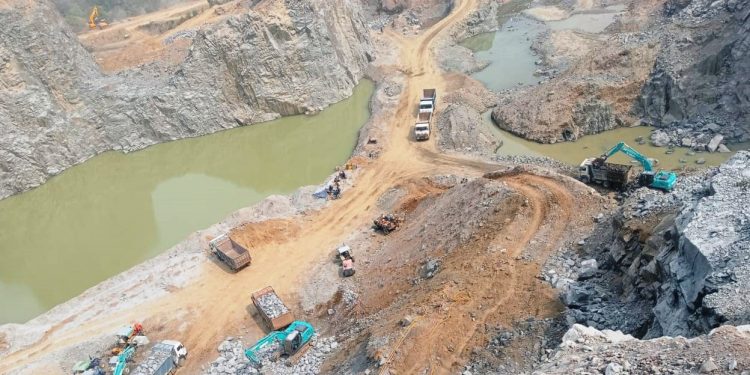Jajpur: A recent report by the Comptroller and Auditor General (CAG) has flagged large-scale irregularities in the tendering process for black stone and sand mines in Jajpur district.
The audit highlights that manipulation in the bidding process over the past decade has led to significant revenue loss for the state government.
According to Rule 27(2) of the Odisha Minor Mineral Concession Rules, 2016, tenders for mining leases are to be issued through public notification by a competent authority. Interested applicants must submit their bids in sealed envelopes, along with the required documents. The lease is granted to the highest bidder based on the quoted rate.
However, the CAG’s audit reveals that in several cases under Dharmasala tehsil, bidders were selected through manipulated tender fixing, bypassing competitive procedures. It was found that the top two bidders in some cases were related, as evident from their personal details and residential addresses. When the highest bidder ‘deliberately’ withdrew from the process, the second-highest, often with significantly lower rates, was awarded the lease, the auditor’s report states.
This manipulation resulted in the selection of bidders quoting prices between Rs 140 and Rs 1,045 less per cubic metre than the highest bidders. “The government thus failed to receive competitive prices, causing substantial financial loss,” the report adds.
Notably, despite the withdrawal of top bidders, the administration took no penal action, leading to further revenue leakage. The CAG report estimates that during the five-year lease period across three black stone and sand mines, the government suffered a revenue loss of Rs 1.18 crore due to under-quoted extraction of 72,753 cubic metres of minor minerals.
These examples are only indicative, as similar malpractice is suspected in several other mining leases where the lessees reportedly amassed wealth through irregular tender selection. Despite this, the responsible tehsildars failed to report these issues to higher authorities, the report points out.
In one instance, in the Aruha Black Stone Mine (Lease No. 1/2017–18), the highest bid was Rs 220 per cubic metre, while the second-highest was only Rs 80. The withdrawal of the top bidder and subsequent lease to the lower bidder resulted in a revenue loss of Rs 95.49 lakh.
“Similarly, in the Barada Black Stone Mine (2018–19 to 2022–23), the highest bid was Rs 1,195 per cubic metre, compared to the second-highest of Rs 150. After the top bidder’s withdrawal, the second bidder was awarded the lease, leading to a loss of Rs 76.74 lakh,” the report states.
In another case, for the Buddha Sand River Mine at Bhagabatpur (2018–19 to 2022–23), the highest and second-highest bids were Rs 2,101 and Rs 1,575 per cubic metre, respectively, resulting in a loss of Rs 27.65 lakh. Furthermore, in the Rahadpur Black Stone Mine (2016– 2021), the highest bidder submitted a photocopy of the bank guarantee instead of the original. Despite this, the tehsildar finalised the lease in their favour. The bidder, instead of depositing the full due of Rs 1.13 crore for 2017–18, paid only Rs 43.97 lakh and continued mining. “With no proper guarantee and lack of pressure from the tehsildar, Rs 69.27 lakh remained unpaid. Even after including interest, Rs 1.49 crore remained outstanding, with no legal action taken,” the CAG report reveals.
In conclusion, the report underscores that the selection of unqualified bidders across multiple mining projects has cost the state government several crores of rupees in lost revenue, pointing to severe lapses in oversight and accountability within the mining lease administration.
PNN







































